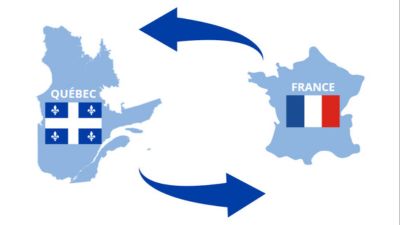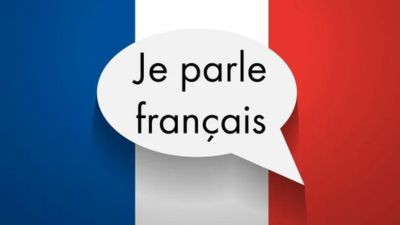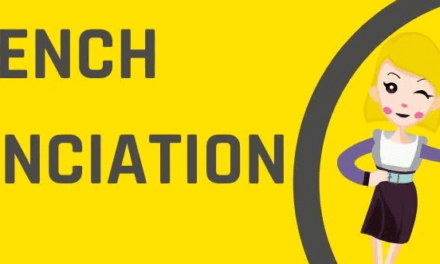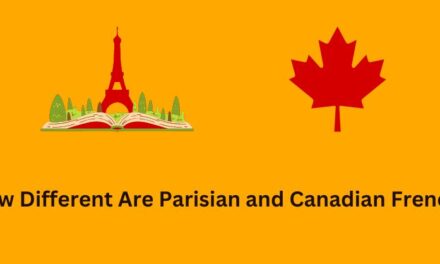How Different Are Parisian and Canadian French?
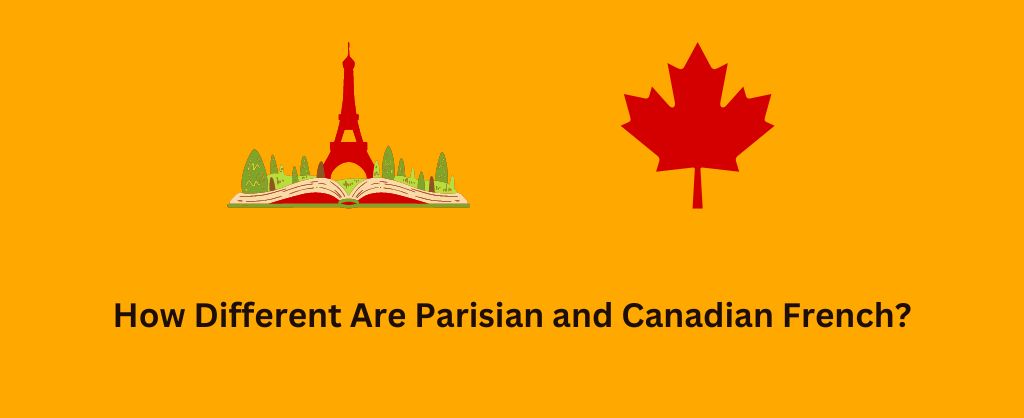
French is an important global language spoken by over 300 million people worldwide. However, there are many dialects and accents of French that vary by region.
Two of the most prominent varieties are Parisian French and Canadian French. So which version should you focus on learning?
Here’s an in-depth look at the key differences, examples, and factors to consider when deciding between Parisian and Canadian French.
Content
- Overview
- Key Differences
- Reasons to Learn Parisian French
- Reasons to Learn Canadian French
- Tips for Learning Both Varieties of French
- Conclusion
Overview of Parisian and Canadian French
Parisian French, also known as Metropolitan French, is the prestige dialect spoken in Paris and most of northern France.
It is considered the standard version of the French language. Parisian French is what you will hear in French films, television, music, and more.
Canadian French is spoken primarily in the Canadian province of Quebec, as well as smaller francophone communities across Canada.
It diverged from Parisian French due to Quebec’s isolation and preservation of older French language features. Canadian French has some unique vocabulary, expressions, pronunciation, and grammar conventions.
While mutually intelligible, there are noticeable variations between the two dialects. Below we discuss some of the main differences to understand.
French Pronunciation, Phonetics & Rhythm Practice
Key Differences Between Parisian and Canadian French
Canadian French and Parisian French are noticeably different dialects, but still mutually understandable for the most part. Some of the main differences are in pronunciation, common vocabulary, verb usage, and slang.
How different is Canadian French to Parisian French?
Canadian French has a more melodic tone, uses different words like “fin de semaine” instead of “weekend”, and incorporates more English words than Parisian French.
The accents and language conventions are distinct, though not radically incomprehensible.
Let’s look at some crucial differences:
Vocabulary and Expressions
One of the biggest differences between Parisian and Canadian French is the vocabulary and common expressions used.
Here are some examples:
- Weekend – The weekend is la fin de semaine in Canadian French rather than le week-end in Parisian French.
- By the way – En passant in Canadian French instead of au fait in Metropolitan French.
- Bus – Autobus is used in Canadian French whereas bus is more common in Parisian French.
- Foreigner/tourist – A tourist is a touriste in France compared to un visiteur in Quebec.
As you can see, many everyday words differ between the dialects. Parisians and Quebecers simply use different terms for the same things in many cases.
Pronunciation and Accents
Pronunciation and accents also set Canadian and Parisian French apart. Quebec French has a very distinctive pronunciation and melodic tone.
Some of the differences include:
- More emphasis on ending syllables and letters – ParleR versus PARler in France.
- Harsher R sounds coming from the throat.
- Vowels have a tense, clipped quality – OuI versus oui in Parisian French.
- More nasal vowel sounds.
- Different intonation, stress, and rhythm.
The accents can make it quite challenging for speakers of one variety to understand the other initially. With exposure, the differences become more comprehensible.
Verb Tenses and Conjugation
Verbs are conjugated a bit differently in Canadian versus Parisian French.
- More use of the simple past (passé simple) rather than the compound past (passé composé) for completed actions.
- Conditional perfect tense (j’aurais fait) more widely used in Canada.
- Different pronouns used for the vous form – vous in Metropolitan French vs. vous autres in Quebec.
- Verbs like commencer and appeler are irregular in Canadian French.
While Parisians would say “J’ai fait” (I did), Quebecers are more likely to say “Je fis” – using the simple past tense. Verb grammar isn’t radically different but the conventions do contrast.
Differences in Sounds and Spelling
Canadian and Parisian French sometimes differ in the sounds and spelling of certain words:
- The ‘ti’ sound in words like nation is more sharply pronounced as ‘tsi’ in Canadian French.
- Words spelled with ‘oui’ in France are changed to ‘oi’ in Quebec – like avoine instead of avoine for oatmeal.
- Ending consonants are sometimes dropped in Canadian French. Internet becomes Interne.
While minor, these sound and spelling variations add to the unique flair of Quebec French.
Loanwords and Anglicisms
Due to proximity and cultural influence, Canadian French incorporates more loanwords and expressions from English.
- Un week-end – Whereas Parisians say la fin de semaine.
- Le parking – Instead of le stationnement in Metropolitan French.
- Words like le burger, le camping, and le hot-dog – More English words are used for modern concepts.
This English creeping into the language is called franglais. It’s very common in Quebec due to the Anglophone influence.
Can Parisians understand Quebecois?
Yes, Parisians can understand Quebecers without too much difficulty. The different vocabulary and accents may require concentration at first, but the languages have the same French root.
Exposure and experience will allow Parisians to comprehend Canadian French. Media and music from Quebec also helps Parisians adapt to the dialect.
Can people in France understand Canadian French?
Overall, people in France are able to understand Canadian French, especially if exposed to it regularly. The pronunciation, expressions, and slang will sound different from what they’re used to, but remain intelligible.
Understanding Québécois gets easier the more French speakers hear and interact with the dialect. Some occasional clarification may be needed, but generally mutual comprehension is achievable.
Examples of Parisian vs. Canadian French
To further illustrate the differences, below are some examples of typical Parisian and Canadian French phrases:
Parisian
Je vais prendre le bus pour aller au travail. (I’m going to take the bus to go to work.)
Tu veux un sandwich au jambon? (Do you want a ham sandwich?)
J’ai passé le week-end avec des amis. (I spent the weekend with friends.)
Canadian
Je vais prendre l’autobus pour aller au bureau. (I’m going to take the bus to go to the office.)
Veux-tu une sandwich au jam? (Do you want a ham sandwich?)
J’ai passé la fin de semaine avec des chums. (I spent the weekend with friends.)
You can see the vocabulary, pronunciation, and slang differences on display. While mutually intelligible overall, the French sounds and feels noticeably distinct between Paris and Montreal.
Reasons to Learn Parisian French
Below are some of the main advantages for studying Parisian French:
- It’s the official standard – Parisian French is considered proper international French. It’s useful for formal education, business, and official contexts.
- More resources available – The vast majority of French learning materials use Parisian French, especially at beginner levels. Apps, videos, textbooks, classes, etc. teach Metropolitan French.
- Understood worldwide – French speakers globally will comprehend your Parisian accent and grammar, especially if exposed through media. It has international versatility.
- Visiting France – If you plan to spend time in France, you should learn Parisian vocabulary, culture, and pronunciation. Locals will appreciate the effort.
- Live abroad – To fully integrate in France long-term, focusing on Parisian French is advised. It will make social and professional life much smoother.
If you want formal French useful across the globe, Parisian French is a safe choice. The standard version will serve you well in most situations.
Reasons to Learn Canadian French
What are the potential benefits of studying Canadian French? Here are some top reasons:
- Live in Quebec/Canada – For those moving to Quebec or other French-speaking parts of Canada, learning the local Canadian French is vital for daily life.
- Understand Québécois media/culture – Much entertainment, news, books, etc. use Canadian French. Learning it will help you appreciate Quebec’s cinema, TV, and more.
- Stand out from typical French learner – Most students tackle Parisian French. Focusing on Canadian French makes you unique.
- Language preservation – Helping preserve minority languages and dialects like Canadian French has value. Being able to speak it aids cultural diversity.
- Gain locals’ appreciation – Quebecers will be thrilled if you make an effort to learn their dialect and culture. It shows respect.
If you have strong ties to Canada or want a uniquely North American French experience, Canadian French is worthwhile. The locals will thank you for it!
Tips for Learning Both Varieties of French
For some French learners, focusing on only one dialect may not be ideal. Here are some tips for learning both Parisian and Canadian French:
- Start with Metropolitan French – Get a core base in Parisian vocabulary, grammar, etc. It’s the best foundation before tackling Canadian French.
- Use a mix of resources – Combine textbooks, media, and classes from France and Quebec to get broad exposure. Apps like Duolingo teach both dialects.
- Practice listening skills – Train your ear to adapt to the different accents and speech patterns. Comprehension will improve with time.
- Travel to both regions – Immerse yourself in each dialect by visiting both Paris and Quebec City, for example. Nothing beats real cultural experience.
- Find conversation partners – Practice speaking with both Parisians and Quebecers to gain fluency and feedback in each style of French.
- Stay flexible – Don’t expect to become perfectly bilingual. The goal is communicating comfortably in either dialect as needed.
With dedication, it’s possible to learn both main forms of French. The versatility will serve you well across the French-speaking world!
Conclusion
In summary, Canadian and Parisian French have distinct vocabulary, slang, accents, grammar, and more that differentiate them. But they remain mutually intelligible dialects of the same root language.
Parisian French is ideal if you want standardized French for broad use and travel. Canadian French is perfect for connecting with Quebec’s unique Francophone culture and community. Some learners may even tackle both dialects for maximum versatility.
Focus on your motivations for studying French and where you want to use it. That will dictate whether Parisian or Canadian French is better for your needs. With immersion and practice in your chosen dialect, you’ll be parlez-ing in no time!

